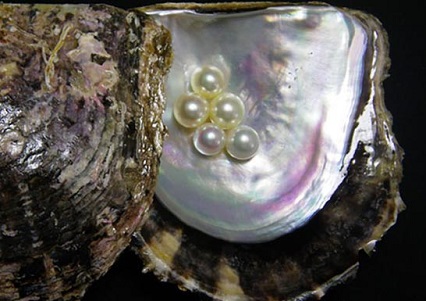Nikhil Prasad Fact checked by:Thailand Medical News Team Jul 20, 2024 9 months, 6 days, 14 hours, 3 minutes ago
COVID-19 News: Ancient Medicine Meets Modern Science
In a groundbreaking study, researchers from the Yangtze Delta Region Institute of Tsinghua University in Jiaxing, China, have discovered a natural peptide derived from pearls that could potentially inhibit the interaction between SARS-CoV-2, the virus responsible for COVID-19, and the human ACE2 receptor. This
COVID-19 News report delves into the study, highlighting its key findings and potential implications for COVID-19 treatment.
 Chinese scientists explore peptides from pearls to treat COVID-19
The Promise of Pearl-Derived Peptides
Chinese scientists explore peptides from pearls to treat COVID-19
The Promise of Pearl-Derived Peptides
Pearls have long been revered in traditional Chinese medicine for their detoxifying and therapeutic properties. In this study, the focus is on a specific peptide, KKCH, extracted from Pinctada fucata pearls. This peptide has shown potential as an inhibitor of the interaction between SARS-CoV-2 and ACE2, the primary receptor that the virus uses to enter human cells.
How the Study Was Conducted
-Molecular Docking and Binding Analysis
The research team, led by Dr Xiaojun Liu and Dr Rongqing Zhang, employed molecular docking techniques to model the interaction between the KKCH peptide, the SARS-CoV-2 spike protein, and the ACE2 receptor. Molecular docking revealed that KKCH binds to the same pocket on the ACE2 receptor as the SARS-CoV-2 spike protein, suggesting that it could effectively block the virus from attaching to and entering human cells.
-Surface Plasmon Resonance (SPR) Analysis
Further analysis using Surface Plasmon Resonance (SPR) confirmed the binding affinity of KKCH to ACE2. The KKCH peptide demonstrated a strong affinity for the ACE2 receptor, comparable to that of the SARS-CoV-2 spike protein, indicating its potential effectiveness as a competitive inhibitor.
Key Findings
-Inhibition of Spike Protein Binding
The study found that KKCH could significantly inhibit the binding of the SARS-CoV-2 spike protein's receptor-binding domain (RBD) to the ACE2 receptor. This inhibition was dose-dependent, with higher concentrations of KKCH resulting in greater inhibition of the spike protein's binding ability.
-Cellular Level Confirmation
To validate these findings at the cellular level, the researchers conducted immunofluorescence experiments using human lung epithelial cells (BEAS-2B) and embryonic kidney cells (HEK293T). The results showed that KKCH effectively reduced the binding of the SARS-CoV-2 spike protein to the cell surfaces, further supporting its potential as an antiviral agent.
Antiviral Activity in Virus Models
-Pseudovirus Inhibition
The antiviral activity of KKCH was tested using a SARS-CoV-2 pseudovirus model. The results indicated that KKCH could inhibit the entry of the pseudovirus i
nto host cells, with an IC50 value (the concentration required to inhibit 50% of viral entry) of 398.1 µM. This suggests that KKCH is effective at preventing the virus from entering cells in a controlled, simulated environment.
-Live Virus Neutralization
To further confirm its antiviral potential, KKCH was tested against the live SARS-CoV-2 virus. The peptide demonstrated a dose-dependent inhibitory effect on the virus, with an IC50 value of 462.4 µM. This finding highlights KKCH's promise as a natural inhibitor capable of blocking SARS-CoV-2 infection in real-world scenarios.
Safety and Cytotoxicity
An essential aspect of any potential treatment is its safety. The study included cytotoxicity tests on BEAS-2B, HEK293T, and Vero cells to assess the safety of KKCH. The results showed that KKCH had no significant cytotoxic effects on these cells at concentrations below 480 µM, indicating that it is safe for use in therapeutic applications.
A Natural Solution to a Global Challenge
The discovery of KKCH's ability to inhibit SARS-CoV-2 binding to the ACE2 receptor offers a promising new avenue for COVID-19 treatment. By blocking this critical interaction, KKCH could prevent the virus from entering human cells, thereby reducing infection rates and potentially aiding in the management of COVID-19.
Conclusion: Hope on the Horizon
This study sheds light on the potential of natural products in combating viral infections. The KKCH peptide from Pinctada fucata pearls has demonstrated significant inhibitory effects against SARS-CoV-2, making it a promising candidate for further development as a therapeutic agent.
The study findings were published in the peer-reviewed: International Journal of Molecular Sciences.
https://www.mdpi.com/1422-0067/25/14/7902
For the latest
COVID-19 News, keep logging on to Thailand Medical News.
Read Also:
https://www.thailandmedical.news/news/herbs-and-phytochemicals-methyl-rosmarinate-from-rabdosia-serra-is-an-allosteric-inhibitor-of-sars-cov-2-3cl-protease
https://www.thailandmedical.news/news/herbs-and-phytochemicals-study-shows-that-3-epi-betulin-from-daphniphyllum-glaucescens-inhibits-sars-cov-2-entry-and-suppresses-inflammation
